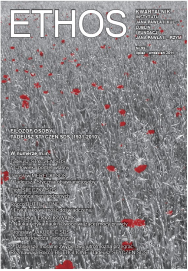Vol. 24 No. 3 (2011): PHILOSOPHER OF THE PERSON TADEUSZ STYCZEŃ (1931−2010)
Full Issue
FROM THE EDITORS
Articles
38-41
published: 2011-09-30
42-46
published: 2011-09-30
47-74
published: 2011-09-30
75-83
published: 2011-09-30
129-134
published: 2011-09-30
135-149
published: 2011-09-30
150-160
published: 2011-09-30
161-176
published: 2011-09-30
177-189
published: 2011-09-30
216-226
published: 2011-09-30
227-236
published: 2011-09-30
243-244
published: 2011-09-30
264-268
published: 2011-09-30
307-318
published: 2011-09-30
319-321
published: 2011-09-30
322-324
published: 2011-09-30
Notes and reviews
325-332
published: 2011-09-30
333-339
published: 2011-09-30
340-343
published: 2011-09-30
344-348
published: 2011-09-30
349-360
published: 2011-09-30
Reports
361-364
published: 2011-09-30
365-368
published: 2011-09-30
369-374
published: 2011-09-30








